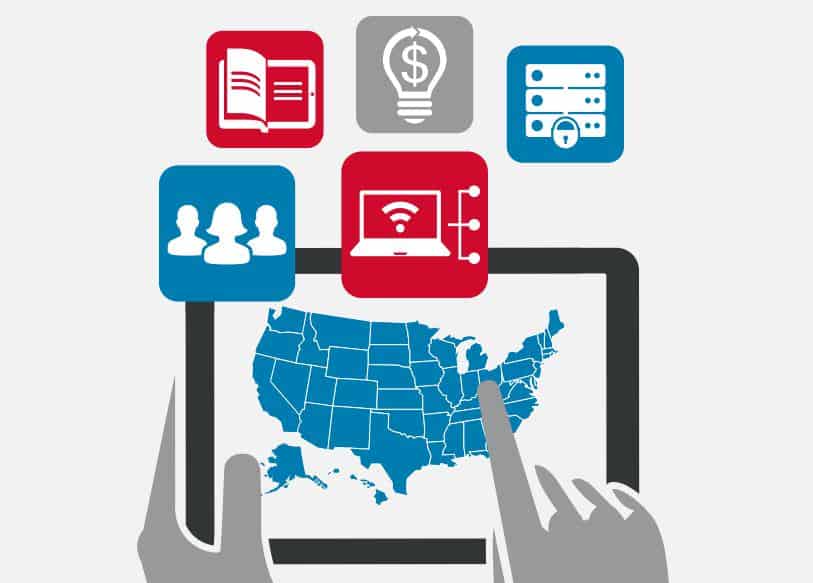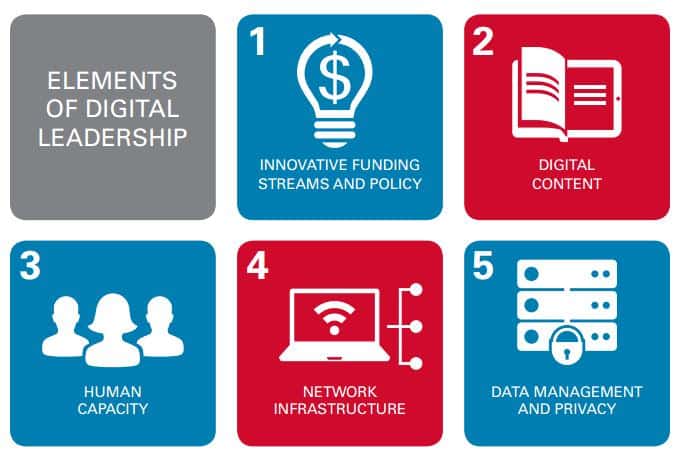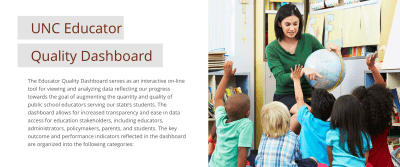
Technology impacts all aspects of our lives – it has changed and enhanced everything from how we socialize to how we interact professionally. It has changed how we plan personally, professionally, and financially. Similarly, technology has the potential to enhance educational experiences for students through digital learning. Schools that are infused with digital learning have found that technology is a critical component to meet the needs of all digital-age learners.
States, districts, and schools have made – and will continue to make – investments in devices, bandwidth, networking, digital content, and teacher training to promote digital learning. Many are upgrading and expanding the digital resources that serve as an integral part of specific initiatives such as a one-to-one program, online assessments, or school improvement goals. Others have broader digital learning initiatives like project-based learning, personalized learning, or competency-based education, which are enhanced by technology. With digital learning, teachers have the potential to personalize learning for all students. Students are more engaged in a digital learning environment, in part because it is more in line with how students learn and interact with the world. Further, digital learning represents how students will be expected to learn in college and career. Digital learning can increase access to high quality educational opportunities and contribute to narrowing the achievement gap.
What is Digital Learning?
The Alliance for Excellent Education defines digital learning as “any instructional practice that is effectively using technology to strengthen the student learning experience. Digital learning encompasses a wide spectrum of tools and practices, including online and formative assessments, increased focus and quality of teaching resources, reevaluating the use of time, online content and courses, applications of technology in classrooms and school buildings, adaptive software for students with special needs, learning platforms, participation in professional communities of practice, access to high-level and challenging content and instruction, and many other advancements technology provides to teaching and learning.”
Many states are looking to support the expansion of technology tools and resources in K12 education through state policies, programs and funding in order to provide digital learning opportunities for all students. While much movement toward digital learning happens at the school or district level, state policymakers should consider several factors as these efforts are promoted, including:

Innovative Funding Streams and Policy: The degree to which state legislatures and state boards of education fund digital learning and pass policies to promote digital innovation.
Digital Content: The flexibility to include digital resources, including the vetting, deployment, and delivery of these resources to the classroom level.
Human Capacity: The positions and ongoing training necessary to ensure that teachers and leaders know how to leverage the technology provided in schools in a way that promotes student learning.
Network Infrastructure: The statewide infrastructure, broadband access, and relevant supports that are necessary for digital learning.
Data Management and Privacy: The development of data management and privacy policies design to protect students’ personally identifiable information.
Elements of Digital Learning Leadership
While there has been progress toward digital learning nationwide, several states have emerged as leaders in embracing digital learning via state policies and practices in all five areas described above: Alabama, Indiana, Kentucky, North Carolina, and Utah.
North Carolina
Ahead of the changes that will be included in the state’s new Digital Learning Plan (to be released in 2015), North Carolina has already made substantial progress in bringing digital learning to every district across the state.
Innovative Funding Streams and Policy
N.C. Session Law 2013-12 requires the North Carolina Department of Public Instruction (NCDPI) to assist districts in the transition from textbooks to digital materials by 2017. These materials must be effective for all learners and align with the curriculum and standards. Such a law promotes progress toward some level of digital learning statewide. Further, N.C. Session Law 2013-11 and N.C. Session Law 2013-226 call on the State Board of Education to develop and implement digital teaching and learning standards for teachers and administrators by July 2017. This ensures that all teachers will have some level of competency for leading digital learning environments. The passage of these laws in 2013 represents statewide momentum to move to digital learning by 2017. To facilitate important first steps toward this goal, NCDPI asked the Friday Institute for Educational Innovation to comprehensively consider the changes required in a statewide transition to digital learning, the state’s role in these changes, and to make recommendations via the NC Digital Learning Plan. Their expertise in the areas of network infrastructure, professional learning, and digital resources will come together in a comprehensive plan in the fall of 2015.
Digital Content
As part of its Race to the Top grant, NCDPI implemented an instructional improvement system. The efforts connected to HomeBase strive to create a single login portal that will coordinate access to student records, teacher lesson plans, teaching resources, professional development resources, teacher-student communication tools, online student learning opportunities, and teacher evaluation tools. HomeBase is also one hub for OER across the state. Not only does DPI endorse OER materials on HomeBase, it has also created a series of resources including Crosswalks of state standards and other instructional resources that are aligned with the state standards. In addition, for more than ten years, the Digital Teaching and Learning division of NCDPI has offered NC WiseOwl as a free resource for districts statewide. NC WiseOwl provides several subscription databases to educators at no charge.
Human Capacity
NCDPI has a number of statewide initiatives designed to build capacity in state, district, and school level leaders, many of which are in partnership with the Friday Institute for Educational Innovation. The North Carolina 1:1 Learning Technology Initiative (NCLTI) is a partnership between the Friday Institute and the state’s Board of Education. It is a strategic initiative designed to address pedagogy, technology/ infrastructure, policy, professional development, community engagement, funding, and organization as necessary components of a sustainable model for supporting future-ready students in North Carolina.
NCDPI also supports the building of professional human capacity by offering trainings through a regional system of support. There are rich instances of online professional development as well as face-toface options. North Carolina’s partnership with Intel® Education offers varied strategies for education professionals across the state.
Additionally, the Friday Institute has partnered with the North Carolina Principal and Assistant Principal Association (NCPAPA) to provide the Distinguished Leadership in Practice – Digital Learning program (DLP-DL). DLP-DL is a professional development program geared toward principals. It coaches and guides principals as they create digital learning environments in their schools. The program uses a blended model for learning and is grounded in real school-based applications and best practices for leading a successful digital transformation.
Offered through a partnership between the N.C. Department of Public Instruction, UNC School of Government’s Center for Public Technology and MCNC, the Certified Educational Chief Technology Officer (CeCTO) program is one of the nation’s first technology-centered certification programs for educators. The program features two components – one designed for superintendents and the other for technology directors. Superintendents participate in the “Leaders for the 21st Century” track – a 20-hour instructional course supplemented with required collaborative sessions with CeCTO candidates. Technology directors participate in 240 hours of instruction.
Network Infrastructure
Microelectronics Center of North Carolina (MCNC) is a technology non-profit that builds, owns, and operates a leading-edge broadband infrastructure for North Carolina’s research, education, non-profit healthcare, and other community institutions. In 2010, MCNC was awarded two rounds of Broadband Technologies Opportunities Program funding to expand high-speed connectivity through the North Carolina Research and Education Network. As a result of their work in conjunction with the Friday Institute and NCDPI every school across the state has wireless broadband access.
Data Management and Privacy
N.C. Session Law 2014-50, passed in 2014, requires the NCDPI to notify parents of their rights regarding data collection, and it allows them to amend their students’ data or opt out entirely. N.C. Session Law 2014-50 also establishes systems and requirements for data storage and transfer and defines who can access student data and how that data should be stored.
Conclusion
Digital learning has the potential to transform education for students nationwide. With digital learning, teachers are better able to personalize learning for all students; and students have instant access to high quality learning materials that meet their learning needs. No longer is student learning bound by what is available between the covers of their textbooks, technology allows students to learn anytime, anywhere and provides more equitable access to content.
Increasing the availability of digital and personalized learning requires that state leaders think strategically about the following key areas: funding and policy, digital content, and building human capacity network infrastructure, and data management and privacy. Strategic planning in each of these five areas is critical to the success of any digital learning program. In particular, ensuring equitable access to high quality digital learning requires a shared vision and leadership from state policymakers. Without building a shared vision, leaders in schools will not buy-in to the plan and will not necessarily make progress toward state goals.
This research shows that many states are making progress toward seamless digital learning environments and that models and lessons learned are continually evolving. Some critical areas for consideration that emerge include:
State Investment in Funding and Policy: States leading in digital learning have stable funding streams which sustainably fund digital learning statewide. However, many also have other, more flexible streams of money available to districts ready for innovation. These more flexible funds often provide policy flexibility to support the innovation.
Digital Content: Leaders in digital content have allowed for flexibility in terms of what “content” means. Policies permit districts to purchase various types of digital content and have in place high-quality, vetted repositories to share OER and other digital content with all teachers. Digital learning has evolved to include more dynamic resources that allow students to both consume material and to produce.
Development of Human Capacity: Professional learning for leaders at the state, district, school, and classroom level is imperative for the transition to digital-age learning. States who are successfully building capacity are doing so through innovative programs that establish partnerships and build on local expertise. Further, these leaders are building buy-in by creating a shared vision which drives all learning.
Systemic Approach to Networks and Infrastructure: Network infrastructure is necessary but not sufficient to digital learning. State leaders must think strategically about how to maximize resources to provide equitable access to devices and to ensure adequate infrastructure for digital learning. They must also plan to ensure that the technology supports excellent teaching practices.
Student Data and Privacy: There is an increasing need for educational leaders to ensure that all of the appropriate stakeholders have secure access to relevant of student data. Transparent plans for collecting, sharing, and protecting student data are necessary steps toward preventing breaches of personal information.
Leadership at the state level is paramount.
Without strong leaders crafting a vision, which includes all five focus areas described in this report, statewide progress toward digital learning is difficult. As policymakers consider investments in technological tools and resources, they should also consider their broader vision for digital learning for their students.
Here is the full report, including assessments of the others states.





